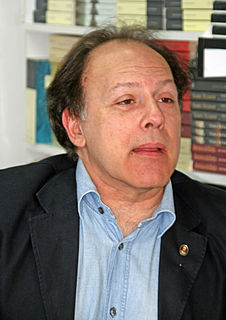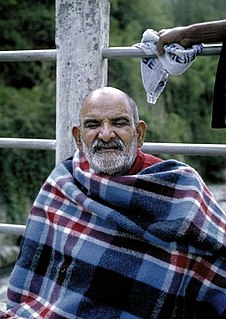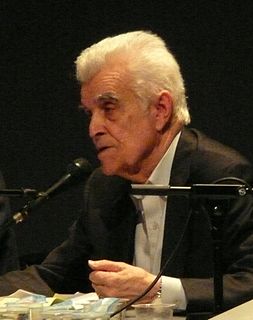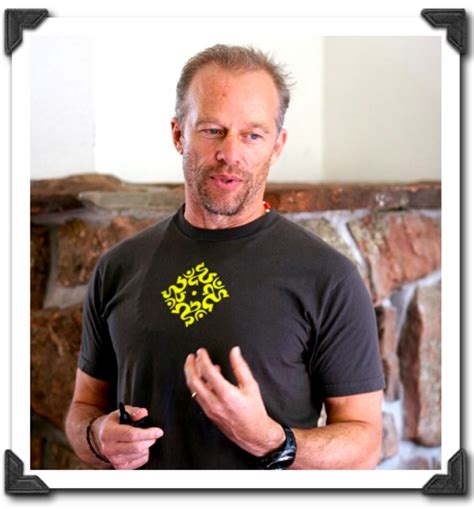A Quote by Rajneesh
Buddha says this is how one should be - no desire, because all desires are futile. They are about the future; life is in the present. All desires distract you from the present, all desires distract you from life, all desires are destructive of life, all desires are postponements of life. Life is now and the desire takes you away, farther and farther away from now. And when we see that our life is misery we go on throwing the responsibility on others, and nobody is responsible except us.
Related Quotes
That is Buddha`s meaning of nirvana: to be free from life and death, to be free from desire. The moment you are free from all desires... remember, I repeat, ALL desires. The so-called religious, spiritual desires are included in it, nothing is excluded. All desires have to be dropped because every desire brings frustration, misery, boredom. If you succeed it brings boredom; if you fail it brings despair. If you are after money there are only two possibilities: either you will fail or you will succeed. If you succeed you will be bored with money.
If you have desires, try to look - are those desires the cause of your misery? Nobody wants misery, but nobody is willing to drop the desires - and they are together, they cannot be separated. This is one of the greatest insights that has come from all the enlightened people in the world - that desire is the root of all misery, and desirelessness is the cause of all that is beautiful and blissful.
We all have to lead our own life, and we only have the one life, and the only people who can live life not according to their own desires are those who have no desires--which is the majority, actually. People can say what they like, they can speak of abnegation, sacrifice, generosity, acceptance, and resignation, but it's all false. The norm is for people to think that they desire whatever comes to them, whatever they achieve along the way or whatever is given to them--they have no preconceived desires.
See what your misery is, what desires are causing it, and why you are clinging to those desires. And it is not for the first time that you are clinging to those desires; this has been the pattern of your whole life and you have not arrived anywhere. You go on in circles, you never come to any real growth. You remain childish, stupid. And you are born with the intelligence that can make you a buddha, but it is lost in unnecessary things.
Every time you have a desire, in a certain sense you have a goal, something you would like to be, do, or have. Some desires are merely passing fancies, but others stay with us and go deeper. Our desires and our goals give us direction and focus. They help point us down our path of action in our life.
Buddha says: Life should be simple, not complex. Life should be based on needs, not on desires. Needs are perfectly okay: you need food, you need clothes, you need a shelter, you need love, you need relationship. Perfectly good, nothing wrong in it. Needs can be fulfilled; desires are basically unfulfillable. Desires create complexity. They create complexity because they can never be fulfilled. You go on and on working hard for them, and they remain unfulfilled, and you remain empty.
Prayer is the offering up of our desires to God in the name of Christ, for such things as are agreeable to his will. It is an offering of our desires. Desires are the soul and life of prayer; words are but the body; now as the body without the soul is dead, so are prayers unless they are animated with our desires.
Christianity set itself the goal of fulfilling man’s unattainable desires, but for that very reason ignored his attainable desires. By promising man eternal life, it deprived him of temporal life, by teaching him to trust in God’s help it took away his trust in his own powers; by giving him faith in a better life in heaven, it destroyed his faith in a better life on earth and his striving to attain such a life. Christianity gave man what his imagination desires, but for that very reason failed to give him what he really and truly desires.
Life is short and tedious, and is wholly spent in wishing; we trust to find rest and enjoyment at some future time, often at an age when our best blessings, youth and health, have already left us. When at last I that time has arrived, it surprises us in the midst of fresh desires; we have got no farther when we are attacked by a fever which kills us; if we had been cured, it would only have been to give us more time for other desires.
There is a close relationship between a house full of possessions and a heart full of desires, between a cluttered closet and a crowded schedule, between having no place to put possessions and having no priorities for our life. These are precious clues. They remind us to slow down, to live in the present, to reduce the desires that drain our vitality, to clarify priorities so we can give our time and attention to what matters most. Tragically, in the press of modern life, we have managed to get backwards one of life's most vital truths: people are to be loved; things are to be used.
There are urges and urges; you are exploding with urges, desires. You don`t have one desire, you have many desires. Not only that you have many desires, you have contradictory desires. If one is fulfilled, the other, which is its contradiction, remains unfulfilled and you are in misery. If the other is fulfilled, then something else remains unfulfilled.
The body is there because the mind seeks desires through the body; desires cannot be fulfilled without the body. You can be completely fulfilled without the body, but desires cannot be fulfilled without the body. Desire needs the body; the body is the vehicle of desire. That's why possession happens. You have heard, you must have heard, many stories about a ghost possessing somebody else. Why is a ghost so interested in possessing somebody else? It is because of desires. Desires cannot be fulfilled without a body, so he enters somebody's body to fulfill his desires.
If yoga is about life, this means ALL life, not just part of it. Together, the spiritual and the material constitute the whole you, the whole of the experience of being human, and the nature of the universe in which you live. There may be no step more important to achieving ultimate fulfillment than accepting what the Vedas teach us about desires--that some desires are inpsired by your soul.
































